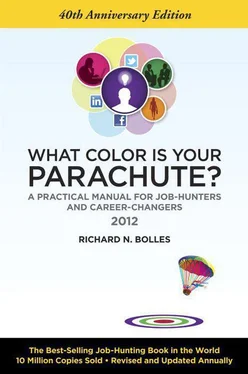Appendix C. A Guide to Choosing a Career Coach or Counselor
IF YOU DECIDE YOU NEED ONE
All readers of this book divide into two families, or groups. The first group are those who find the book is all they need, particularly if they do the exercises in chapter 13successfully, on their own.
The second group are those who find they need a little bit of extra help. Either they bog down in their effort to complete the whole book, or they start the exercises in chapter 13and then get stuck, at some point. So they want some additional help.
Fortunately, there are a lot of people out there, anxious to help you with your job-hunt or career-change, in case this book isn’t sufficient by itself. They go by various names: career coach, career counselor, career development specialist, you name it. They’re willing to help you for a fee—because this is how they make their living. That fee will usually equal the fee charged by other types of counselors in town, say a good psychologist. That will range from about $40 an hour in rural areas, on up to … you don’t want to know . The fee may be charged by the hour (recommended) or as one large lump sum up front (definitely not recommended). And most towns or cities of any size have free or almost-free help, too, even though it’s likely to be in a group and not face-to-face with an individual counselor. For “free,” or “almost free,” see Susan Joyce’s marvelous website ( job-hunt.org, or as she likes to say, “job dash hunt dot org”) for the section called Networking and Job Search Support by State , at http://tinyurl.com/7a9xbb.
Now, about those coaches or counselors who charge to help you. There are some simply excellent ones, out there. In fact, I wish I could say that everyone who hangs out a sign in this business could be completely recommended. But—alas! and alack!—they can’t all be. This career-coaching or career-counseling field is largely unregulated. And even where there is some kind of certification, resulting in their being able to put a lot of degree-soundin’ initials after their name, that doesn’t really tell you much. It means a lot to them of course; in many cases, they purchased those initials with their blood, sweat, and tears. ( Although a few, sad to say, got the initials after their name by mail-order or after one long weekend of training. Tsk, tsk. But, oh well, no different I suppose from a lot of other professions. Some people are always looking for shortcuts .)
I used to try to explain what all those initials meant. There is a veritable alphabet-soup of them, with new ones born every year. But no more; I’ve learned, from more than forty years of experience in this field, that 99.4 percent of all job-hunters and career-changers don’t care a fig about these initials. All they want to know is: do you know how to help me find a job? Or, more specifically, do you know how to help me find my dream job—one that matches the gifts, skills, and experience that I have, one that makes me excited to get up in the morning, and excited to go to bed at night, knowing I helped make this Earth a little better place to be in? If so, I’ll hire you. If not, I’ll fire you .
How to Lose Your Shirt (or Skirt)
So, bye-bye initials! Let us start, instead, with this basic truth:
All coaches and counselors divide basically into three groups:
a) those who are honest, compassionate, and caring, and know what they’re doing;
b) those who are honest but don’t know what they’re doing; and
c) those who are dishonest, and merely want your money—large amounts, in a lump sum, and up front. These are often so-called executive counseling firms —some executive counseling firms—rather than individual counselors .
In other words, you’ve got compassionate, caring people in the same field with bums and crooks. Your job, if you want help and don’t want to waste your money, is to learn how to distinguish the one from the other. It would help, of course, if someone could just give you a list of those who are firmly in the first category—honest and know what they’re doing. But unfortunately, no one (including me) has such a list, or ever has had. You’ve got to do your own homework or research here, and your own interviewing, in your chosen geographical area. And if you’re too lazy to take the time and trouble to do this research, you will deserve what you get . Why is it that you and only you can do this particular research? Well, let’s say a friend tells you to go see so-and-so. He’s a wonderful coach or counselor, but unhappily when you meet him he reminds you of your Uncle Harry, whom you detest. Bummer! But, no one except you knows that you’ve always disliked your Uncle Harry.
That’s why no one else can do this research for you—because the real question is not “Who is best?” but “Who is best for you?” Those last two words demand that it be you who “makes the call.”
A special word, here, to those considering paying any firm that focuses on executives or people who make or would like to make a high salary. (This warning is regarding firms , not individual counselors.) If you are an executive you are considered a fair target for any scam the mind can imagine. New ones appear every year. I have consulted with the Federal Trade Commission in Washington, and States Attorneys General over the years, where they have described the scams to me in detail. I have collected news items, done individual interviews with those who got “taken,” and I wish I could tell you about individual firms, but that’s not my job. Do your own research. If you are considering signing up with any such firm, Google them first: you will come across timely research about any firm. Example: http://corcodilos.com/blog/3219/theladders-how-the-scam-works-2.If you are too lazy to do this research, and subsequently get “taken,” let me share the words a Scotsman once said to me, when I got “taken”: “I’m sorry ya lost yer money, but ya dinna do your homework.”
Now, for all my other readers: your dilemma is between categories a and b above. How do you find an honest counselor who knows what they’re doing , and can give you a little bit of help, if you bog down in using this book, most especially chapter 13.
The first bright idea that will occur to you might be something along the lines of “Well, I’ll just see who Bolles recommends.” Sorry, no such luck. I rarely if ever recommend anyone. Some of the coaches or counselors listed in the Sampler at the end of this appendix, try to claim that their very listing here constitutes a recommendation from me. Oh, come on! They’re there because they asked to be. I ask a few questions, but I don’t have time to do any thorough research on them. This Sampler is more akin to the Yellow Pages, than it is to Consumer Reports . Let me repeat this—as I have for forty years now—and repeat it very loudly:
The listing of a career counselor or coach in this book does NOT constitute an endorsement or recommendation by me. Never has meant that. Never will. (Any counselor or coach listed here who claims that it does—either in their ads, or brochures, or publicity—gets permanently removed from this Sampler the following year after I find out about it, and without warning.) This is not “a hall of fame”; it is just a Sampler of names of those who have asked to be listed , and have answered some reasonable questions .
Читать дальше












